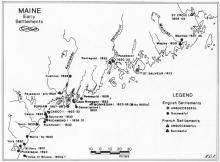Early Settlement
The earliest serious settlement attempt in Maine was Champlain’sChamplain, Samuel de Samuel de Champlain
1567-1635. Between 1603 and 1635, Champlain made 12 voyages to what was to become Canada, establishing it as a French colony, founding Quebec, and exploring up the St. Lawrence River to the Great Lakes. For Maine, he is chiefly known for his 1604-1607 voyage, in which he wintered at St Croix and made the first accurate maps of the New England coast. 1604-5 French colony on an island at the mouth of the St. Croix River. The French colonists gave up after one winter, but the next year established a permanent settlement nearby.
In 1607-8, Sir Ferdinando GorgesGorges, Sir FerdinandoSir Ferdinando Gorges
c.1566-1647. Wealthy British nobleman and governor of Plymouth, a main sponsor of a number of exploring expeditions and colonization attempts in New England, having been granted major lands.
Read more., Sir George PophamPopham, George George Popham
c. 1550-1608 . Merchant and ship captain, nephew of Sir John Popham, Lord Chief Justice of England and one of the prime financial backers of the Popham colony. George Popham was in command and president of the Popham Colony; his death in February, 1608 was a major factor in the colonists' decision to abandon Fort St. George., and Sir Humphrey GilbertGilbert, Sir Humphrey Sir Humphrey Gilbert
c.1539-1583. English nobleman and explorer who annexed Newfoundland to Britain in 1583. He was lost at sea on his return voyage. He had been active in promoting English North American colonization. Queen Elizabeth reissued Gilbert's exploration and colonization patent to Walter Raleigh, Gilbert's brother in law, who used it to plant a colony at Roanoke., as leaders of the Plymouth Company, attempted to establish the Popham ColonyPopham Colony
The first English colony in New England, established at the mouth of the Kennebec River in 1607, called Fort St. George. The colonists returned to England in 1608.. After a severe winter during which Popham and many of his colonists died, the colony was disbanded and the colonists returned to England. The Popham colonists built the pinnace Virginia, the first ocean-going ship built in North America.
Around the same time, the London CompanyLondon Company
Also called Virginia Company of London, an English stock company established in 1606 to establish colonies in America. One of two identical companies, the other being the Plymouth Company. Responsible for establishing Jamestown. established JamestownJamestown
The first English colony in Virginia, founded in 1607. 2007 is the 400th anniversary of the settlement. Maine has contributed to this by building re-creations of two of the Jamestown Expedition's ships, Godspeed and Discovery.. In 1609 the London Company gained exclusive rights to previously shared territory on America’s coast.
In 1620, Sir Ferdinando Gorges obtained a land grant extending from the Piscataqua River to the Kennebec. He called it the Province of Maine, and established its capital at Gorgena, now York. Gorges wanted to establish an Anglican, royalist territory extending from present-day Philadelphia to the St. Lawrence River. He granted land to some of his friends in England, hoping to prevent the PuritansPuritans
Members of the English Anglican Church who wanted to reform or purify the church, advocating strict religious discipline and simplification of the ceremonies of the Church of England. In America the term is used to refer to the immigrants led by John Winthrop who arrived in 1630. of the Massachusetts Bay Colony from gaining control of Maine. The ProprietorsProprietors
Those to whom the British king granted exclusive control over a colony. This allowed the king to indirectly control the colony without investing. Sir Ferdinando Gorges became one of the proprietors of the Province of Maine in 1622, splitting it at the Piscataqua River in 1629. who received these grants founded some of Maine’s earliest towns. Overlappping and vague land grant boundaries created disputes that lasted for 200 years.
By 1658, the Province of Maine had become a colony of Massachusetts—a colony of a colony.

